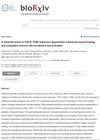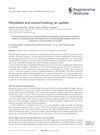 7 citations,
November 2013 in “Pediatrics in Review”
7 citations,
November 2013 in “Pediatrics in Review” Acne is a chronic skin condition not caused by poor hygiene or diet, and it requires long-term treatment and patient education.
[object Object]  4 citations,
November 2021 in “Pharmaceuticals”
4 citations,
November 2021 in “Pharmaceuticals” Paeonia lactiflora and Poria cocos extracts can potentially increase hair growth and reduce hair loss symptoms by lowering testosterone and inflammation levels.
 3 citations,
November 2023 in “Frontiers in cell and developmental biology”
3 citations,
November 2023 in “Frontiers in cell and developmental biology” Melanocytes are important for skin and hair color and protect the skin from UV damage.
2 citations,
November 2023 in “Biomolecules” WNT signaling is crucial for skin development and healing.
 2 citations,
March 2021 in “Molecular Immunology”
2 citations,
March 2021 in “Molecular Immunology” Dermal macrophages might help regrow hair.

research Acne
2 citations,
May 2011 in “Harper's Textbook of Pediatric Dermatology” Acne is a common skin condition linked to diet, hormones, and genetics, and early treatment can prevent scarring.
 2 citations,
January 2011 in “Elsevier eBooks”
2 citations,
January 2011 in “Elsevier eBooks” Early treatment of acne is crucial to prevent scarring and psychological effects.
 1 citations,
September 2023 in “Applied sciences (Basel)”
1 citations,
September 2023 in “Applied sciences (Basel)” Ishige sinicola extract may help prevent muscle atrophy through its antioxidant and anti-inflammatory effects.
 1 citations,
January 2018 in “Acta dermatovenerologica Alpina, Pannonica et Adriatica (Tiskana izd.)”
1 citations,
January 2018 in “Acta dermatovenerologica Alpina, Pannonica et Adriatica (Tiskana izd.)” The herbal extract was found to effectively reduce and prevent hair loss without any side effects.
 1 citations,
September 2013 in “Elsevier eBooks”
1 citations,
September 2013 in “Elsevier eBooks” Hair ages and thins due to factors like inflammation and stress, and treatments like antioxidants and hormones might improve hair health.
 August 2024 in “International Journal of Molecular Sciences”
August 2024 in “International Journal of Molecular Sciences” Androgenetic alopecia involves immune cell disruptions, especially increased CD4+ T cells around hair follicles.
 April 2024 in “bioRxiv (Cold Spring Harbor Laboratory)”
April 2024 in “bioRxiv (Cold Spring Harbor Laboratory)” GRK2 is essential for healthy hair follicle function, and its absence can lead to hair loss and cysts.
 April 2024 in “Frontiers in pharmacology”
April 2024 in “Frontiers in pharmacology” Cynoglossum amabile has medicinal potential but poses safety concerns due to liver toxicity.
 February 2024 in “Scientific reports”
February 2024 in “Scientific reports” Four genes are potential markers for hair loss condition alopecia areata, linked to a specific type of cell death.
 January 2024 in “Deleted Journal”
January 2024 in “Deleted Journal” Essential oils may help hair health but lack strong scientific proof and can cause allergic reactions.
 January 2024 in “Deleted Journal”
January 2024 in “Deleted Journal” Essential oils like lavender, chamomile, and bergamot help manage stress and improve well-being.
 January 2024 in “Tropical journal of pharmaceutical research”
January 2024 in “Tropical journal of pharmaceutical research” Cirsium japonicum var. spinossimum seeds may help reduce inflammation and fight cancer.
[object Object]  August 2023 in “International journal of research in Ayurveda and pharmacy”
August 2023 in “International journal of research in Ayurveda and pharmacy” Garudan Kizhangu Ennai may effectively treat alopecia areata but needs more research to confirm its safety and effectiveness.
 August 2023 in “Natural Resources for Human Health”
August 2023 in “Natural Resources for Human Health” Vegetarians should take B vitamin supplements to avoid health issues.
 April 2023 in “Medizinische Genetik”
April 2023 in “Medizinische Genetik” New research has found 14 genes linked to the risk of developing alopecia areata, improving understanding and treatment options.
 September 2022 in “bioRxiv (Cold Spring Harbor Laboratory)”
September 2022 in “bioRxiv (Cold Spring Harbor Laboratory)” A parasite-derived molecule speeds up skin healing and affects immune cell behavior without increasing scarring.

Wild African goats have genetic adaptations for surviving harsh desert conditions.
 September 2020 in “Annals of the National Academy of Medical Sciences. India”
September 2020 in “Annals of the National Academy of Medical Sciences. India” COVID-19 can cause skin issues like "COVID toes," rashes, hair loss, and hand eczema, and dermatologists are important for recognizing these signs.
 January 2020 in “Elsevier eBooks”
January 2020 in “Elsevier eBooks” Plant-based chemicals may help hair growth and prevent hair loss but need more research to compete with current treatments.
 September 2014 in “Aktuelle Dermatologie”
September 2014 in “Aktuelle Dermatologie” The symposium concluded that environmental factors significantly contribute to skin aging.
 March 2014 in “Medicina cutánea ibero-latino-americana”
March 2014 in “Medicina cutánea ibero-latino-americana” Melatonin applied to the scalp helps increase hair density in people with early hair loss.
 June 2011 in “CRC Press eBooks”
June 2011 in “CRC Press eBooks” Low-Level Laser Therapy can stimulate healing and cell function, potentially leading to wider medical use.
 146 citations,
July 2018 in “Regenerative Medicine”
146 citations,
July 2018 in “Regenerative Medicine” Understanding different types of skin cells, especially fibroblasts, can lead to better treatments for wound healing and less scarring.
 127 citations,
December 2005 in “Experimental Dermatology”
127 citations,
December 2005 in “Experimental Dermatology” Stress can stop hair growth in mice, and treatments can reverse this effect.
 124 citations,
February 2018 in “Nature Reviews Genetics”
124 citations,
February 2018 in “Nature Reviews Genetics” Stem cell plasticity is crucial for wound healing but can also contribute to cancer development.





























